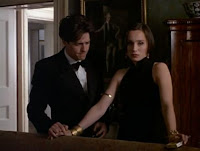The goal is to tell a story that's epic in scope by focusing on personal stories, and it's a technique that's mostly successful. It allows intimate storytelling about a historical event so huge one can easily forget that real people were involved. Stealing the show at every turn is Mark Rylance, an actor who's lack of cinematic output meant I only discovered him relatively recently. Here he plays a man piloting one of the 'small boats'. His grim determination to do the right thing tempered we assume by the memories of horrors of wars past. The fact that the script allows such personal story-telling and performances that carry weight is impressive in a film that requires expansive shows of hundreds of men cowering on a vast empty beach.
However, the film's scope is a little too large. No matter how great Rylance's command of the camera when he is on screen, it is very much an ensemble cast. The fact that we flit between the timescales with only a cursory opportunity for character development does harm the flow. I applaud the final film for its production, effects, editing, sound, attention to detail and script; but it really is a slog to watch as we know how the story ends, and it becomes a 2 hour churn of survival and boredom and escape and return for the characters involved. I feel like you need something to break up the flow and let the story breath. I'm not suggesting that's easy as the story truly is epic, and telling it piecemeal from different angles / time-frames necessitates tough choices. Essentially it's amazing, but a serious slog to actually watch. Probably best enjoyed in two sittings.
So,
all films are political. What are Dunkirk's politics? The right wing
subtexts Christopher Nolan's cinematic output are well-documented, so is
Dunkirk is a film that plays into the narrative of English
exceptionalism? Its release in the year after the Brexit vote saw it
being adopted by well-known Brexit supporters as somehow channelling an
anti-European sentiment. All those deceitful French and frightened
Dutch running from the German behemoth - leave it to the Brits to sort
it all out. So went 1940, so goes 2017. If that is what Nolan intended
then it is sad indeed. But I doubt his motives were quite so nakedly
political in playing to the UKIP crowd. The British soldiers on the
beach are hardly portrayed as paragons of heroic intent, rather as men
and boys who are caught in a historical moment and just want to see
another day. I am prepared to give Nolan the benefit of the doubt here,
and hand responsibility for nationalistic tub-thumping to the
Faragists.
I suppose it would had been nice to
have a couple of non-white Brits on the beach (there are black French
soldiers shown), but the honest truth is I have no idea what the ethnic
mix of the British Expeditionary Force was in 1941. For all I know the
film is completely realistic in its casting. I don't feel I have enough
information to judge.
Well that was a bit of a slog wasn't it?















